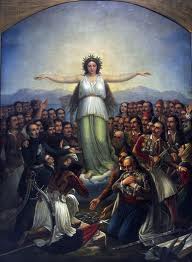10 years ago, February 17, 2002.
Where was the former Governor of the Bank of Greece and at the time Vice-President of the European Central Bank Lucas Papademos, today Prime Minister of Greece, with his wife Shanna?
Don’t try guessing, too hard. They were at a reception, on the occasion of the 75th anniversary of the Bank of Greece, organized for an exhibition of a selected group of 39 paintings and prints covering the period 1830-1930 from its own collection and from other – mostly private – Athenian collections.
The event was inaugurated with a speech by then Governor Nicholas C. Garganas on Monday, 17 February 2002, 10 years ago.
Spirits were full of high hopes then in Athens and in the rest of the euro area. The euro was showing its beneficial effects already: spreads in Greece and elsewhere with respect to the German Bund had collapsed, making – as a seemingly innocuous consequence – the cost of borrowing for Greek (and Italian) families incredibly low. Consumer credit-driven economic growth started then. It fuelled the profits of the banking sector, eager to lend vitality to a credit boom with little worry for its likely bust.
Greece had entered the euro with the lowest, among the 12 countries, productivity rate. Convergence of Greek productivity to euro countries standards should thus have been essential to preserve stability in the currency area, by reducing the temptation to exit through devaluation as a consequence of lower competitiveness, lower export, lower growth. Indeed, the EU Treaty requires convergence. And the Greek abided to their uneasy task: a Mc Kinsey report on Greece shows that over the 2000-2009 Greek yearly productivity growth by far exceeded the EU one: 2.5 vs 1.1%. Alas, it was still not enough: in 2009 it still was 29% below EU-15. More reforms, a daunting task, should have been done to recuperate export competitiveness.
Why not all reforms were done?
Because the drug of credit-led growth made Greece and its peers, the EU council, forgetful that unless competitiveness was fully restored fragility would rise. Actually the EU did something worse: instead of focusing on reforms, it focused a decade of debate on whether deficit to GDP ratios were under the magic and absurd 3% threshold. Nothing else was discussed for 10 years in Brussels. No reforms and none of the necessary investments were forced on Greece. Nothing.
Actually a 3,1% deficit to GDP figure was the scariest thing that could occur to a country, that would have been forced to a humiliating and Kafka-style trial to justify and rectify itself in front of its peers. So here you have why accounting tricks became the norm. It still not justifies why all other countries, that obviously knew about these tricks, turned their head the other side and faked not knowing.
In 2008, the financial crisis made its appearance and it was Game Over. Greece had no fuel anymore to grow: the banking fuel was gone and the credit crunch started biting, as the ROE of Greek banks went from 15% of the 2005-2007 period to -1,5% in 2009. But, also, the other, sounder, fuel for growth, productivity and investment, had not been inserted and it was too little too late to have it in a few periods.
Then here came the second European mistake. It asked Greece finally to do more reforms, and that was good, a bit too late though. So it needed a quick boost to recuperate immediately growth. But, fundamental mistake, it did so by asking to do austerity to restore competitiveness, through wage deflation and restrictive fiscal policies.
Quite a strange choice, especially if you consider it was in full contradiction with what was done in a previous European experiment just 20 years before. A monetary union, between country A and country B, with A having high productivity and B a very low one. The Prime Minister of country A decided, against all polls and against the Central Bank opinion, to expand public investment dramatically in country B and to raise wages in it. Country A was West Germany, country B East Germany.
East Germany is not Greece, a friend says. Try again. The sums involved in saving the Greeks is way way lower than the sums that were poured in East Germany. Second objection: East Germans were the brothers of West Germans, Greeks are distant fourth-degree cousins. Try again. Greeks are the brothers of tomorrow, this is why my generation has subscribed to the euro and EU project, in the hope of brotherhood.
In its speech 10 years ago at the vernissage for the Greek art exhibition, the Governor of the Greek Central bank said: “This is a marvellous occasion for us all to appreciate the emergence of modern Greek painting in those formative years following Greece’s independence. Art not only reproduces what we see; it helps us better understand what we see.”
 I agree, we need art to better understand what we see. Here, get “Greece in Gratitude” (1858) – Theodoros Vryzakis, following Greek’s war of independence.
I agree, we need art to better understand what we see. Here, get “Greece in Gratitude” (1858) – Theodoros Vryzakis, following Greek’s war of independence.
Independence from Europe, gratitude to Europe: what is it that you see?